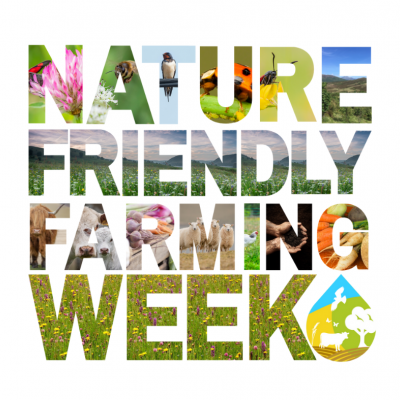Written by Alena Walker, Nature Friendly Farming Network
The Nature Friendly Farming Network’s (NFFN) first annual Nature Friendly Farming Week (16-20 May) celebrated nature-friendly farming for five full days, where nature-friendly farmers took part in daily themes to share their experiences online using the daily hashtags.
Why we need nature-friendly farming #NatureFriendlyFarmingWeek
Across the UK, many farmers and land managers have been re-evaluating their relationship to the land across every system and scale, spanning grassroots regeneration to landscape-wide integrated approaches. From agroecological, organic and pasture-fed to permaculture, min-till and conservation agriculture. Nature-friendly farming comes in all shapes and sizes as part of a bigger transition towards a fairer food and farming future.
Current intensive farming has many negative consequences on the quality of soils, air, water & ecosystems. Unsustainable practices & heavy reliance on inputs reduce the variety of habitats, impact farm business viability & lessen landscape resilience. Nature-friendly farming plays a vital role in re-balancing food production & the environment in a harmonious way that promotes ecosystem function. These farming systems mean the efficient use of natural resources and contribute to food & nutritional security.
What farmers had to say about nature-friendly farming: here, here and here.
Hedges & Edges #HedgesAndEdges
NFFN teamed up with the Woodland Trust Cymru to host Hedges and Edges day with an online webinar and four farm tours in Wales.
Trees play a vital role in addressing the nature and climate crisis. Woodland, agroforestry and hedgerows can make us more resilient to climate change and create a nature-rich landscape beneficial to both farmland and wildlife.
Catch up on our webinar recording here.
Highlights: here, here, here, here and here.
Measuring Progress #MeasuringProgress
You can’t manage what you don’t measure, and audits, surveys, field observations & visible improvements are all part of measuring the tangible difference made by nature-friendly practices.
NFFN Northern Ireland embarked on a carbon & biodiversity auditing project with 35 farmers, where each farm completed an assessment of its carbon footprint and biodiversity value. For Measuring Progress day, farmer Bronagh O’Kane hosted an event at her farm for fellow project farmers to share learnings and insights into their next steps using their auditing results.
Meet some farmers who took part and hear their perspectives on starting on their nature-friendly farming journey. Watch here.
Farmer Will Fazer shares the findings of his auditing results and his plan for returning biodiversity to the farm, regenerating soil health and improving carbon sequestration. Read here and here.
Read more about our auditing project here.
Pastures & Grasslands #MoreThanGrass
Grasslands and pasture account for nearly 40% of UK land. They lock in vast amounts of carbon worldwide and account for one-third of the earth’s carbon storage. They also support biodiverse life above and below ground, including plants, fungi, flora, bacteria, birds and mammals, pollinators and other threatened invertebrates. But in recent decades, species-rich grasslands have declined by 97% and now cover less than 1% of UK land.
Farmer Denise Walton from Peelham Farm in Scotland writes about how grasslands are a planet-cooling, carbon-sinking, water-sponging, biodiversity-banking, food-donating life force. She shares her tips for thriving soils, biodiverse grasslands and profitable farming. Read here.
Farmers can adopt systems that act as an ecological engineering tool for nature restoration and habitat creation - with numerous benefits to the farm. Nikki Yoxall - farmer, NFFN steering group member and Head of Research at Pasture for Life - writes about how grazing management can preserve grasslands and pastures. Read here.
NFFN joined forces with Pasture for Life to produce a short video with farmer Duncan Miller. He is a member of the Mob Grazing for Diversity project and farms at Tullochgorum Farm, where the grassland is a fundamental aspect of their business. Watch here.
Hear from Nikki Yoxall on why weeds aren’t problematic but symptomatic of soil conditions and why we should give them more attention. Watch here.
Highlights: here, here, here and here.
Living Legends #LivingLegends
For our Living Legends day, NFFN and Woodland Trust partnered to celebrate farmers protecting ancient & veteran trees on their land. Old trees are a crucial part of a nature-friendly and productive landscape, and they offer farms multiple benefits making their protection a win-win.
Read about key things farmers can do to look after the old trees on their land and learn more about how the Woodland Trust is campaigning to improve the protection of our oldest trees here.
